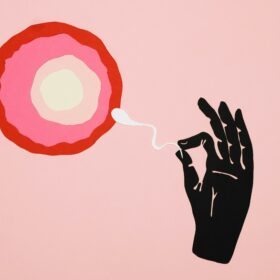
My contraceptive experience: The injection and fertility
Disclaimer: This blog has not been medically reviewed. The views expressed here are those of the writer and do not necessarily reflect those of The Lowdown or our medical team. For information about your contraception or the different methods available please check out our contraception pages.
As a nurse, Shannon wants to help individuals make decisions about their health based on reliable and realistic information. In order to do just that we wanted to share her story with you here, plus some insights from one of The Lowdown’s Clinical Directors, Dr Mel…
Shannon’s story
I have used a range of contraception over the years. I have been with my husband since I was 15 years old and made the decision to start the pill. At 17 while on the pill I was given the beautiful surprise of my daughter who is now 10.
Following the birth of my daughter I felt I needed something that was more convenient and less likely to be forgotten so that I could focus on getting my education and career back on track. The Depo injection seemed like a great choice for me, as I do not mind injections and the idea of a coil or implant did not appeal to me. I was asked if I was planning on having a baby in the next year and I of course quickly said NO. I was on this for around 4 years and I was then advised to take a break due to the risk of osteoporosis.** During the time I was having the injection I did not have a period.
Although I was slightly grossed out by the idea of a contraceptive implant, I decided to try it. I had the implant inserted and can honestly say I soon forgot it was there! It was not painful when it was inserted or removed. I had this in for 3 years with no issues. I again did not have any periods during this time.
I then decided to have a small break in between contraception to make sure I could still get a period! My period soon returned and was back to normal, this gave me the reassurance I needed and decided I was happy to go back on contraception.
This is when I came across the new Sayana Press. I honestly thought this was perfect. I was able to give myself the injection from the comfort of my own home every 3 months and only needed to attend the sexual health clinic once a year. They again asked me if I was planning to have a baby in the next year, I again quickly replied a firm NO.

So then comes the time when I had achieved everything I felt I needed to and the feeling suddenly hit me of how much I actually wanted another child. After having the talk with my husband we both agreed now was the right time and we were fully aware that it could take up to a year for my periods to get back to normal in order to begin trying. The reality of waiting for my body to go back to normal was a long, confusing and frustrating process.
My timeline:
| 8th Sept 2019 | Last injection of sayana press |
| 25th Aug 2020 | First bleed 1 day small amount |
| 2nd Sept 2020 | 1 day small amount |
| 6th Sept 2020 | 1 day small amount |
| 5th – 7th Dec 2020 | Normal bleed (previous periods before the injection would last around 3 days regular amount) |
| 17th Dec – 18th Dec 2020 | Bleed small amount brown in colour |
| 20th – 27th Jan 2020 | Bleed regular to heavy amount |
I have taken numerous pregnancy tests over the past year just to be on the safe side, as I had symptoms of a period/pregnancy and could be extremely emotional at times (not like me at all).
The statement “are you planning to have a baby in the next year” or “it can take up to a year for your periods to return to normal” I feel is quite misleading. I feel this is misleading because this implies you will have some level of irregular period before it returns to normal in around a year’s time.
It is also important to remember that the year starts from when the therapeutic effect is over. It has been over a year since the therapeutic effect of the injection was over and my periods are nowhere near normal.
I am 28 years old, am reasonably healthy, active and have a BMI of 24. Previously my periods were very regular and without complications.
The injection has definitely done what it was made to do, however I feel women who have not yet started a family or do feel they would like another child one day, should possibly see this option as a last resort and explore other options prior to starting the injection. I hope that by sharing my story, this will give other women a more realistic view of the injection and family planning.”
A 2023 update from Shannon:
“Hi, my name is Shannon and I previously wrote a review on the Sayana Press contraceptive injection. The reason I am now writing another review is because when I came off the injection, I was searching the internet like crazy trying to find other women’s experiences. I was disheartened when all I could find was either that they fell pregnant straight away or they just couldn’t fall pregnant. There was never any updates to say whether they actually managed to fall pregnant eventually. I don’t know about you but I don’t like ending stories on a sad note? So I thought I would give other women an update on my experience. As stated in my previous review, my last injection was on the 08/09/2019, therefore it would have stopped working around 15/12/2019. My periods didn’t really return to any normal pattern however….On the 27/08/22 I was surprised to find out I was pregnant. From my dates I would have fallen pregnant around July 2022 and I am now 27 weeks pregnant.We did not have any medical interventions in order to fall pregnant, it was a personal choice to let whatever happen, happen. And I feel extremely lucky that it did happen for us.” 
Dr Mel’s comments
Unfortunately Shannon’s experience highlights how a lack of accessible information and effective communication between health professionals and women who use contraception can lead to lots of anxiety for women, especially for those concerned about their fertility.
Whilst other methods of contraception do not impact on your return to fertility after stopping, women starting or continuing on the progestogen-only injectables (both the Depo-Provera and Sayana Press) should be told there can be a delay in return of fertility up to one year after stopping. The contraceptive injection works mainly by stopping ovulation (the release of an egg from the ovary ready for fertilisation). This advice is based on studies that looked at how long it took before ovulation and conception (falling pregnant) occurred after stopping the injection.1
When we talk about a ‘return of fertility’ what we really mean is a return to a woman’s ‘usual’ fertility. This does not automatically mean that a year after stopping the injection a woman will be fertile or easily able to get pregnant. Her fertility will still depend on her age, genetics and any underlying medical problems. Women who have used contraception for most of their reproductive lives may not be aware of problems affecting their fertility, as contraceptive effects may mask symptoms such as irregular periods. For some women, it is only on stopping contraception, or trying to get pregnant, that they find out there may be an underlying issue.
In order to prevent pregnancy, the injection is usually given up to every 14 weeks. We know that even when it is administered every 16 weeks the rate of pregnancy is less than 1%.1 So in reality this does mean the potential delay of up to one year starts after deciding not to ‘renew’ the injection, or at least three to four months after the last injection was given. The time it takes is different in different women, and according to the manufacturer does not depend on how long you have been using the injection for.2,3 It is important to note that due to wide variation in return to fertility for individual women, women who do not wish to get pregnant on stopping the injection should be advised to start another contraceptive method before or at the time of their next scheduled injection.1
So what does this mean for your periods? Changes to your bleeding pattern is a common side effect with the contraceptive injection and it is normal for some women to have no periods whilst using it.1,2,3 This can be particularly useful for women who have heavy or painful periods.1 As periods and ovulation are linked, there is often a delay in return of periods for women after stopping the injection. However you can ovulate, and therefore get pregnant, without your periods being regular or ’normal’. It is not possible to tell you how long you should expect this to take, or what your bleeding pattern might be like, before your periods return to what is normal for you.
Shannon’s experience has shown that waiting for your fertility to return after stopping the injection can be a stressful experience. Irregular bleeding patterns after stopping the injection may not necessarily indicate whether you are ovulating or not. There is also no need to wait until your periods return to normal after stopping the injection before trying for a pregnancy. According to the manufacturer, over 80% of women trying to get pregnant conceived within 15 months of the last Depo-Provera injection.2 Similarly over 80% will get pregnant within a year of stopping Sayana Press.3 A study comparing how long it took to fall pregnant for women who stopped using the contraceptive injection compared to those who stopped using the non-hormonal copper coil showed that after 2 years there were no significant differences in pregnancy rates.1
When thinking about whether to start, continue or stop the contraceptive injection, discuss any concerns or worries you may have with your healthcare professional. If you’re planning a pregnancy in the next few years, think about the options available to you, such as switching from the injection to another method that has a more easily reversible contraceptive effect. Ultimately, you need to understand the possible side effects of your method of contraception, and be able to discuss what this means for you with your doctor or nurse.
** Progestogen-only injectable use is associated with a small loss of bone mineral density, which is usually recovered after discontinuation. Women using DMPA who wish to continue use should be reviewed every 2 years to assess individual situations, and to discuss the benefits and potential risks.1You can now buy the Sayana press injection directly from the Lowdown
This blog is a part of The Lowdown’s My Contraceptive Journey series. Got an interesting contraception journey of your own? Get in touch with us via Instagram.The views expressed here are those of the writer and do not necessarily reflect those of The Lowdown or our medical team. For information about your contraception or the different methods available please check out our contraception pages.
Our medical review process
This article has been medically reviewed for factual and up to date information by a Lowdown doctor.






